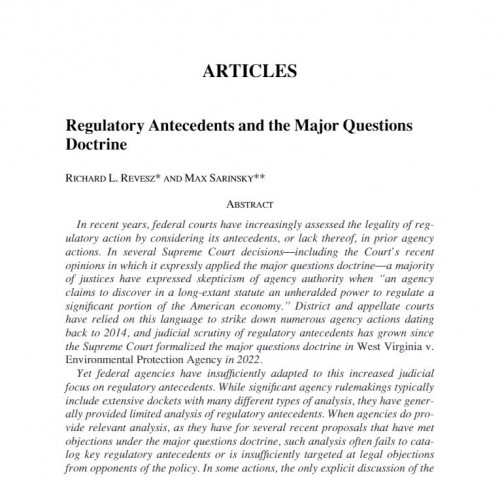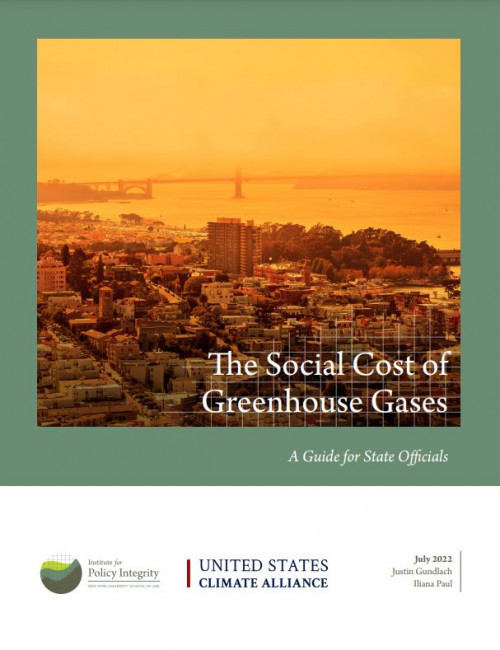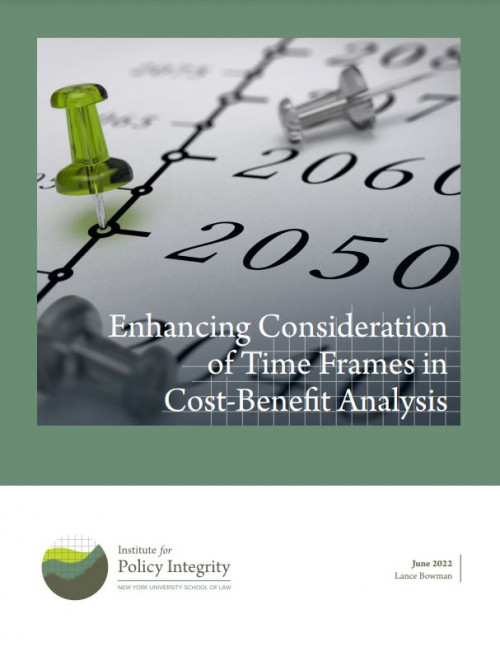-
Major Rules in the Courts
An Empirical Study of Challenges to Federal Agencies’ Major Rules
This working paper summarizes the first empirical study of how major rules, as defined under the Congressional Review Act (CRA), fare in federal court. The study covers each of the 1,870 major rules issued from the CRA’s enactment in 1996 through the end of the Trump Administration. The roughly 24-year period covering four administrations (two from each party) is the longest continuous timespan of any empirical study of agency win rates.
-
Regulatory Antecedents and the Major Questions Doctrine
Published in the Georgetown Environmental Law Review
In recent years, federal courts have increasingly assessed the legality of regulatory action by considering its antecedents, or lack thereof, in prior agency actions. Yet as this article explains, federal agencies have insufficiently adapted to this increased judicial focus on regulatory antecedents. While significant agency rulemakings typically include extensive dockets with many different types of analysis, they have generally provided limited analysis of regulatory antecedents. This article suggests that agencies more extensively catalog regulatory antecedents at all stages of the rulemaking process, from drafting to promulgation.
-
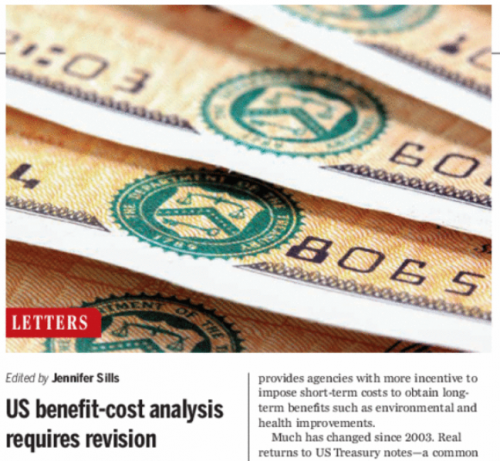
US Benefit-Cost Analysis Requires Revision
Letter in SCIENCE Supporting Proposed Adjustment to Discount Rates in Circular A-4
A critical input in cost-benefit analysis is the discount rate, which determines how much impacts in the future are weighted relative to impacts in the present. Federal guidance currently calls on U.S. agencies to apply discount rates of 3% and 7%. But these rates, particularly the 7% rate, substantially devalue impacts that accrue to future generations, thus putting a thumb on the scale against policies that provide long-term benefits such as environmental and public-health regulation. In April, the Office of Management and Budget (OMB) proposed a comprehensive update to that guidance document, known as Circular A-4. Among other revisions, the draft would update the default discount rate used in federal regulatory analysis to 1.7%. In a letter published in Science, leading global experts on discount rates and cost-benefit analysis support the proposed revision.
-
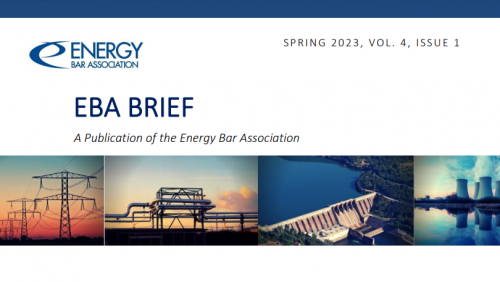
The Impact of West Virginia v. EPA on Challenges to FERC’s Authority Under the Major Questions Doctrine
Published in Energy Bar Association Brief
The Supreme Court’s recent applications of the major questions doctrine have prompted numerous challenges to pending or proposed regulatory actions, including the Federal Energy Regulatory Commission’s (FERC’s) proposed revisions to Order No. 1000’s regional transmission-planning and cost-allocation rules (Transmission Rulemaking) and updated draft policy statements on certification of new interstate natural gas facilities (Draft Policy Statements). This article addresses the impact of West Virginia v. EPA—the most recent Supreme Court case involving the major questions doctrine—on FERC’s regulatory authority.
-
Comments to Federal Acquisition Regulatory Council on Climate Disclosures
We submitted comments to the Federal Acquisition Regulatory Council (FAR Council) on ways to strengthen its proposed rule that would require certain categories of federal contractors to disclose their greenhouse gas emissions and climate-related financial risk, and in some cases set science-based targets to reduce their greenhouse gas emissions.
-
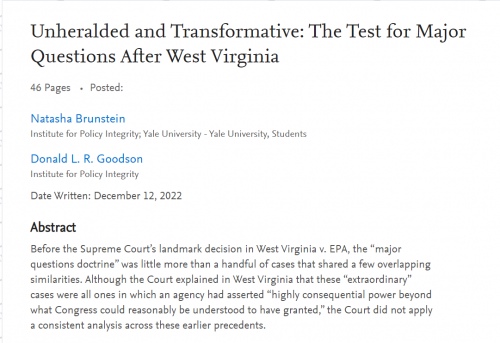
Unheralded and Transformative: The Test for Major Questions After West Virginia
Published in William and Mary Environmental Law and Policy Review
In West Virginia v. EPA, the Supreme Court expressly relied on the “major questions doctrine” for the first time in a majority opinion to hold that a federal agency lacked authority to issue a regulation. Published in the William and Mary Environmental Law and Policy Review, this paper explores whether West Virginia provides such a framework and concludes that it does. A close look at West Virginia and the alternative frameworks that parties and others urged on the Court in the West Virginia litigation also reveals a great deal about what the major questions doctrine is not.
-
Comments to DOE on Grid Resilience and Innovation Partnerships Program
We submitted comments urging DOE to clarify how it will distribute Infrastructure Investment and Jobs Act (IIJA) project funding and to enhance program transparency. We encourage DOE to more specifically detail how it will evaluate applications and to offer a more precise definition of what "community benefits" it hopes to achieve. We also suggest that DOE require project applicants to submit cost-benefit analyses so that the agency can better compare projects when making funding decisions.
-
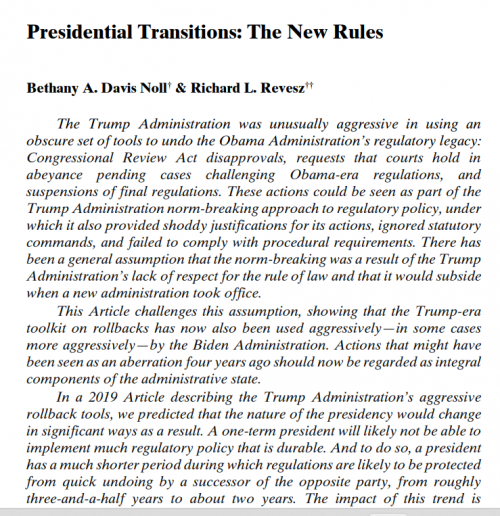
Presidential Transitions: The New Rules
Published in Yale Journal on Regulation
There has been a general assumption that the norm-breaking was a result of the Trump Administration’s lack of respect for the rule of law and that it would subside when a new administration took office. This article challenges this assumption, showing that the Trump-era toolkit on rollbacks has now also been used aggressively—in some cases more aggressively—by the Biden Administration. Actions that might have been seen as an aberration four years ago should now be regarded as integral components of the administrative state.
-
The Social Cost of Greenhouse Gases: A Guide for State Officials
As states step up on climate action, they need a way to weigh climate goals against other policy objectives. The social cost of greenhouse gases (SC-GHG) can help policymakers understand the costs and benefits of climate action and inaction. This new guide for state officials explains why the SC-GHG is a useful policy tool and how it can be applied.
-
Enhancing Consideration of Time Frames in Cost-Benefit Analysis
Federal agencies frequently provide no justification for their analytical time frame when analyzing the costs and benefits of a policy. This is true even when there are costs and benefits that clearly occur beyond the time frame chosen by the agency. In so doing, agencies risk overlooking key long-term impacts that may justify more stringent regulation.
This report argues that the Office of Management and Budget (OMB) should take steps to improve how agencies consider analytical time frames in their cost-benefit analyses.
Viewing recent projects in Government Transparency

